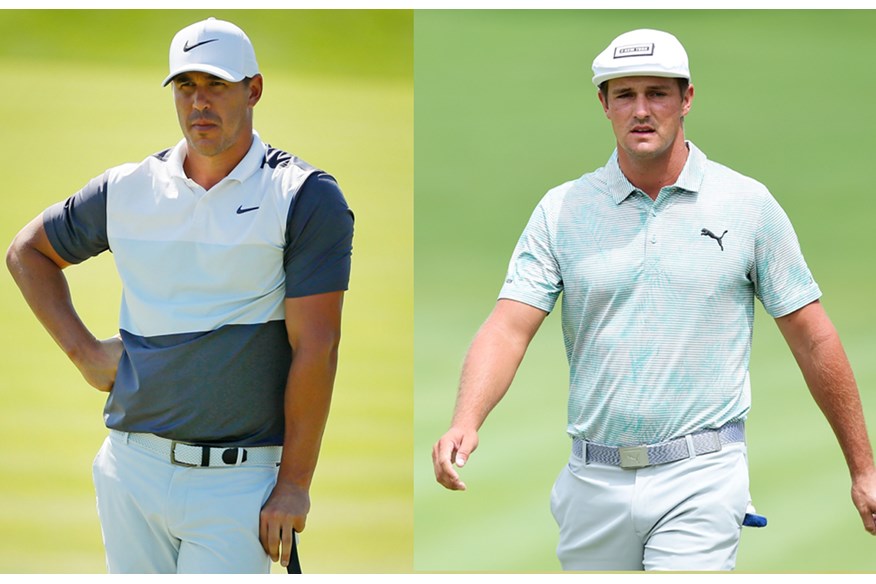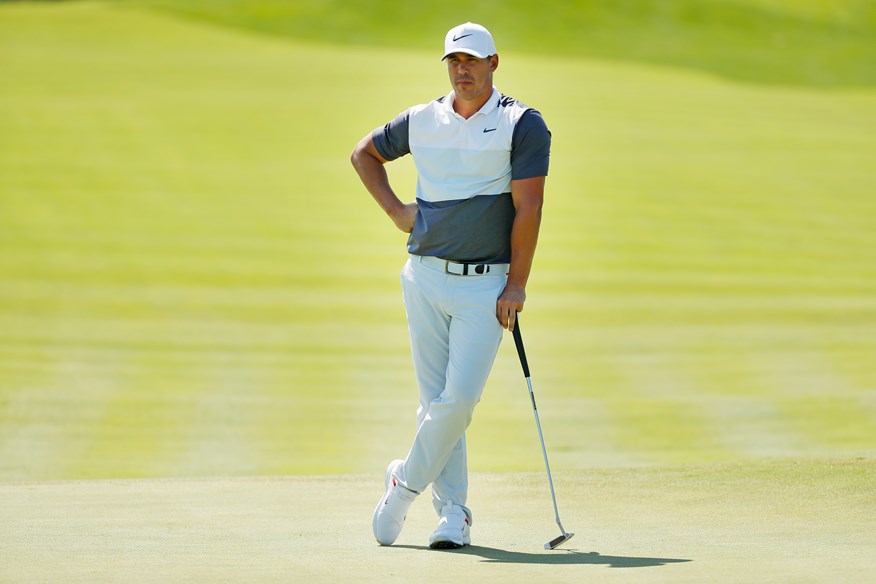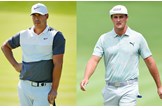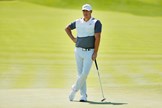Brooks Koepka and Bryson DeChambeau clear the air over slow play
Last updated:
Bryson DeChambeau and Brooks Koepka met face-to-face to discuss the issue of slow play on Sunday at Liberty National
Brooks Koepka has become something of a spokesperson for the players over the issues of slow play, and Bryson DeChambeau made it clear he felt singled out after he was widely criticised at The Northern Trust.
A video was shared on social media of DeChambeau taking over two minutes to line up and eventually hit a putt – which he missed – and as a consequence the issue of slow play became a major talking point over the weekend.
DeChambeau called it ‘an attack’, and it all came to a head when he approached Koepka’s caddie on the range at Liberty National and told him to make any comments about slow play ‘to my face’. Koepka soon walked up to him, and DeChambeau called the outcome ‘fantastic’.
“He just walked up to my caddie and said he wanted to talk,” Koepka explained, “so I went and found him, but I’ll keep that between us.”
“It was awesome. It was actually fantastic,” said DeChambeau. “I appreciate what Brooks did. I have high respect for him because he did that. There was one instance he said in Abu Dhabi, and he said, “Yeah, I said something about that, but it was in general and got blown out of miss proportion.
“It was great. I said, I think we got to start internally so we don’t have these issues come out in public and it creates a bad image for the PGA TOUR. We never want that. So it was great. We had a great conversation, and have a new level of respect for him.”
Asked about his motivation to speak to Koepka, DeChambeau said he wanted to clear the air as he had heard his name mentioned by the World No.1 in the past.
“I just pretty much told him, he said a lot of things about slow play out in the public, and you guys have asked him that and he has the right to say things just as I do,” he said. “I have heard him talk about slow play before and he has mentioned my name before, and I just wanted to clear the air. Make sure that nothing was of any importance after, and he’s got respect for me; I have respect for him. So no issues.
“That’s what I love. That is what we all should be doing as human beings is doing our best to make it right with each other.”
Koepka didn’t divulge exactly what they spoke about and wasn’t as enthusiastic about the talk, but he did underline that he told DeChambeau he wasn’t only pointing the finger at him.
“It was fine,” Koepka said. “No issues.
“It’s not just him. I know he feels singled out, especially when I’m speaking about it. But it’s like I told him, it’s not — I’ve mentioned his name once, and that’s it.
“There’s so many guys out here where it’s become an issue, and obviously him being probably the best player that’s relatively slow right now, he’s going to be on TV a lot more, so you’re going to catch a lot more of those type of instances.”
DeChambeau said he felt that the conversation with Koepka had brought an end to what they needed to talk about regarding slow play.
“We’re going to be playing on a lot of teams together, I hope, and you know, it’s better to get stuff out now and make it right so we go into these team competitions wanting to do our absolute best and not have anything else happen.
“Next week we’ll have conversations internally and make it right internally. There should be no stresses among competitors out here. We’re all trying to provide great entertainment and do our best to play well, and clearly as you saw today, I don’t know if anybody watched, but there was never any question. We were always waiting on the guys in front of us.”
For Koepka, speaking with DeChambeau over a contentious issue was something he said more players should do in golf.
“Everyone out here is probably a little more afraid of confrontation than in other sports,” said Koepka, who said he still wants to talk to him more. “I think you see that. In baseball, you see it, teammates go at each other and they’re still fine. Football, same thing. Basketball, you name it, there’s always been some confrontation on the team, and sometimes it helps, to figure out what the root of the problem is and start working on it.”
The World No.1 then spoke in more detail about what he thinks needs to be done about slow play, and said that while he believes that the problems start within the rule book, change needs to start with the players.
“I think, first off, the issue is it’s in the rule book,” Koepka said. “So if they take it out of the rule book, then you’ve got nothing to complain about. It’s just like hitting it in the water, I have to take a penalty stroke. I’ve said that. I don’t want to take a penalty stroke, and if you take longer than 40, you’ll be penalised. Like I said, I’ll be the guinea pig. Penalise me. I know the rules officials have said it before — they don’t have the balls to penalise us.
“If I go over 40, penalise me. It’s one of those things where, you know, if it’s going to happen, then you know, put it on me. I’m the one that’s talking about it probably the most out of any other player.
“But I think it starts with, you know, players talking about it and that’s how things change. I think that’s how a lot of things with the tour change. Players see things and they view problems and you know they comeuppance with solutions, and that’s the phase we are trying to get into right now.
“I think as players, we do realize there is a little bit of an issue.”
Koepka is hopeful that all this discussion will lead to change, but recognises that for anything to happen, the responsibility comes down to both the Tour and the players.
“I mean, I hope so,” he continued. “But I think it comes down to rules officials enforcing it, players enforcing it. It’s one of those things where if it’s the wrong timing; if we’ve got a par 5 in front of us and you take two minutes and the group in front is waiting, they are just going to say, well, we are right there on pace for the group behind us.
“You know, I’d just like to, if it’s going to be in the rule book, then I would just say enforce it. But if they get rid of it in the rule book, then I’ve got nothing to complain about.
As for self-policing, Koepka says that it might help players to go back and look at the videos of themselves, stating that it helped him overcome anger issues on the course.
“I think sometimes if they were to just go back and look at the video, it might help. It might make them realise how slow it is. Yeah, that helped for me, just with anger. I’m not saying that’s the solution, but if you can get back and see some tape of yourself and realise that it’s a 10-footer, there’s not much that goes into it, you know, that’s where I don’t understand it.”
On Sunday, the PGA Tour announced that they are reviewing their slow-play policy, which currently only puts players ‘on the clock’ if their group is failing to keep to time – rather than focusing on individual players.



